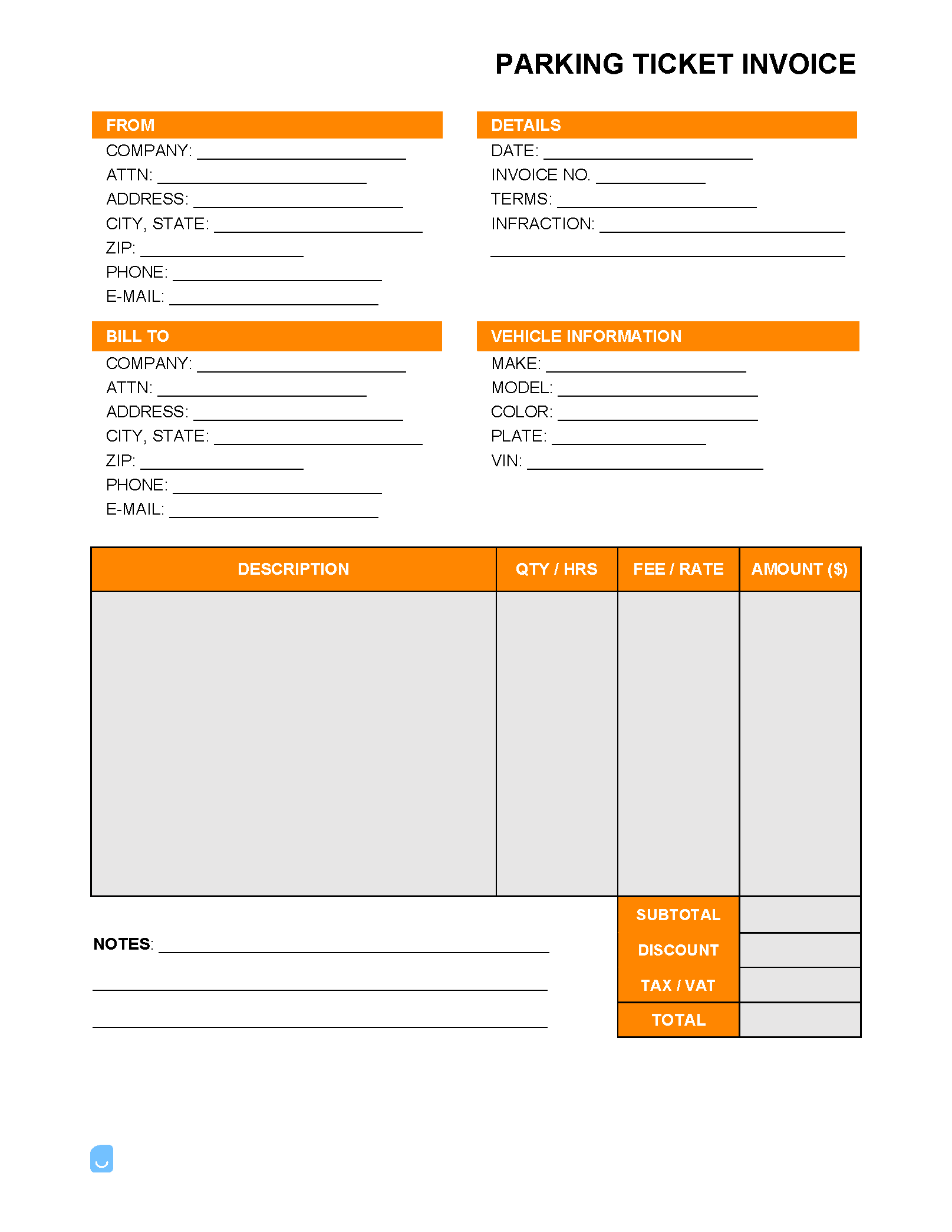Parking Ticket Invoice Template
A parking ticket invoice (also called a “parking charge notice”) notifies the owner of a motor vehicle to pay penalties related to a parking infraction. This form can be issued by security companies, property managers, and parking garage/lot managers.
Everything You Need to Know about Parking Ticket Invoices
A parking ticket invoice requests payment in relation to wrongful parking or a breach of the conditions of use of a parking area. The invoice generally requests a sum of money within a specified and clearly displayed timeframe.
Parking Ticket vs. Parking Ticket Invoice
While the terms “parking ticket” and “parking ticket invoice” are mostly interchangeable, typically a parking ticket refers to a ticket issued by local authorities, such as police officers employed by a city, whereas a parking ticket invoice can be issued by a parking operator. A parking operator is generally someone entrusted with the responsibility of enforcing the conditions of use of a particular property.
Common Ticketable Offenses
Privately issued tickets can be distributed for any activity the company deems wrong and can be proved in court as a breach. These can include:
- Double parking;
- Staying past the allotted or metered time;
- Parking in a handicapped spot or reserved spot; and
- Blocking a fire hydrant, driveway, or throughway.
If a violation goes to court, the parking operator will be required to prove that the rules of use were clearly stated and there was signage in the space telling drivers where to park.
Average Ticket Cost
Parking fees are generally set by the entity issuing the ticket. States and municipalities often have laws and statutes that limit the extent to which companies can impose fines for parking violations. The average cost of a one-time ticket ranges between $10 and $50. Parking garages often charge an amount that increases by the hour, with a significantly higher “overnight charge” for cars that remain wrongfully parked through the night. For each day the car spends parked in the lot without permission, the charge goes up. Issuers can charge different amounts based on the offense or a uniform fee for all violations. Before a property owner begins issuing fines, it is vital to confirm that the law allows private ticketing. Requesting the assistance of a licensed attorney can help with this process.
Creating a Parking Ticket Invoice
A parking ticket invoice should lay out the parking operator’s case and request a sum of money within a specified time. Other important elements of a parking ticket are:
- Company’s name
- Company’s contact information
- Date of infraction
- Invoice number
- Type of infraction
- Vehicle make, model, and color
- License plate number
- VIN number
- Fee or rate
- Total owing
- Applicable taxes
Parking ticket invoices can generally be paid by check, Visa or Mastercard, money order, or cash. Some operators also accept online payments.
What if a Private Ticket Goes Unpaid?
If the sum is not paid within the specified time, the parking operator may take further action to recover the debt, which could include charging interest or even filing a court claim. While privately issued tickets are less enforceable than citations, it is still possible that the operator may be reporting the infraction to the local government so it’s not a good idea to skirt the invoice. Many operators also keep tabs on which cars were issued tickets and when, ensuring that those cars are at a higher risk for not only being ticketed in case of another infraction but also towed or booted.
Invoice Payment Timelines
Payment timelines are at the parking operator’s discretion, but 21 days and 28 days are common timeframes on parking ticket invoices.
